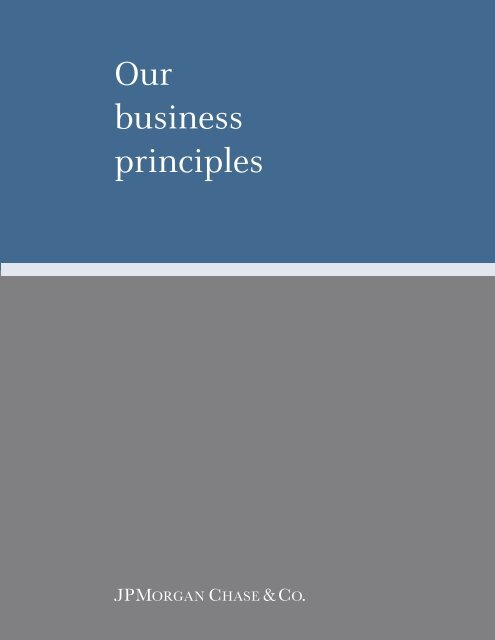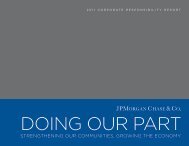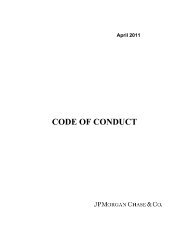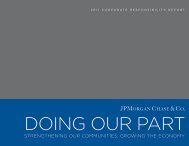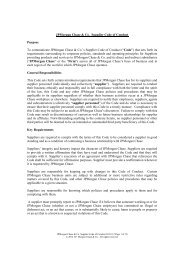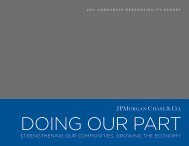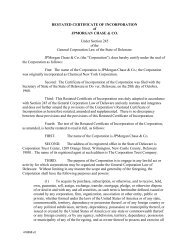Our business principles - JPMorgan Chase
Our business principles - JPMorgan Chase
Our business principles - JPMorgan Chase
You also want an ePaper? Increase the reach of your titles
YUMPU automatically turns print PDFs into web optimized ePapers that Google loves.
<strong>Our</strong><br />
<strong>business</strong><br />
<strong>principles</strong>
<strong>Our</strong> company was built<br />
with hard work over<br />
200 years. We would like<br />
to create a company<br />
that all can be proud of,<br />
and we are confident<br />
that, working together,<br />
we will build the best<br />
financial services company<br />
in the world.
<strong>Our</strong> <strong>business</strong> <strong>principles</strong><br />
Certain <strong>principles</strong> are so fundamental to our success that we would like to describe<br />
them in some detail. If we can adhere to these <strong>principles</strong> – and they are not in order<br />
of importance – we will reach our goal of becoming the best financial services<br />
company in the world. We also hope they will give you a roadmap on how and why<br />
we make our decisions.<br />
Aspire to be the best<br />
• Develop a world-class franchise in every <strong>business</strong> we operate<br />
• Be field- and client-driven, consistently delivering the best products and services<br />
in a cost-effective way<br />
• Innovate, test and learn<br />
• Create powerful brands that carry a commitment of quality and integrity<br />
Execute superbly<br />
• Demand and maintain strong financial discipline, building for good times and bad<br />
• Create and maintain a fortress balance sheet<br />
• Design and maintain the best systems and operations<br />
• Eliminate waste and bureaucracy<br />
• Maintain a strong system of internal governance and controls<br />
• Measure performance through a complete and balanced scorecard<br />
Build a great and winning culture<br />
• Operate with the highest standards of integrity<br />
• Train and retain great managers<br />
• Be open and honest with ourselves, our colleagues, our shareholders and<br />
our communities<br />
• Get incentives right<br />
• Foster an environment of respect and inclusiveness<br />
• Give back to our communities<br />
1
Aspire to be the best<br />
At <strong>JPMorgan</strong> <strong>Chase</strong>, we want to be the<br />
best financial services company in the<br />
world. Because of our great heritage<br />
and excellent platform, we believe this<br />
is within our reach. We cannot promise<br />
specific outcomes or risk-free results.<br />
What we can and will promise is to share<br />
the truth, and offer honest assessments<br />
of our <strong>business</strong>es and our prospects;<br />
act with integrity and honor; do the<br />
right thing, not necessarily the easy or<br />
expedient thing; and work with fierce<br />
resolve to make this a company of which<br />
our shareholders, employees, customers<br />
and communities can be proud.
To be the best we must:<br />
Develop a world-class franchise in every <strong>business</strong> we operate<br />
To be great, a company must have the ability to deliver good returns and solid growth<br />
over time. To achieve these results, we must provide our customers with a broad,<br />
complete and high-quality set of products and services while leveraging the benefits<br />
and efficiency that come with scale. We must also demonstrate our ability to grow both<br />
organically (e.g., new products, market-share gains) and by acquisition. Finally, we must<br />
demonstrate that the whole is greater than the sum of the parts. Each <strong>business</strong> fuels<br />
and complements the others, providing substantial competitive advantages such as<br />
distribution channels (credit cards and mortgages for retail customers, or treasury and<br />
securities services for wholesale clients, to name just a few) and great global brands.<br />
Be field- and client-driven, consistently delivering the best products and services<br />
in a cost-effective way<br />
We must act in the customer’s best interest, not once in a while, but consistently. This<br />
means offering outstanding products and services and being helpful, courteous and<br />
quick to follow up. We need to be keenly aware of the competitive landscape and quick<br />
to act. The field – the employees closest to the customer – should drive this process and<br />
have ample resourcesand authority to be the best at serving customers. <strong>Our</strong> strength<br />
resides in the field. We must exceed customers’ expectations and constantly make it<br />
easier for them to do <strong>business</strong> with us.<br />
Innovate, test and learn<br />
We need to make innovation part of our DNA. This does not mean spending hundreds<br />
of millions of dollars on failed ideas. It does mean, however, that we will take some<br />
calculated risks, knowing that some will fail. It requires that we build forward-looking<br />
ideas into every conversation, every analysis and every new product we look at.<br />
Create powerful brands that carry a commitment of quality and integrity<br />
We are fortunate to have two highly respected and powerful brands. Each of them is<br />
not only a promise to customers, but also a commitment we make to ourselves about<br />
who we are and just how good we want to be. This commitment goes well beyond<br />
creating a name, visual design, symbols, colors or a tag line. To be powerful and trusted,<br />
our brands must be brought to life by the people who represent them and the systems<br />
they use. Talking the talk is not enough. We need to walk the talk and deliver on the<br />
promise every day.<br />
3
Execute superbly<br />
As important as strategy is, we have<br />
got to execute to win. Execution<br />
involves every employee and every<br />
contact we have with customers.<br />
The devil is in the details. We must<br />
act quickly on problems; drive for<br />
results, not just activities; and ensure<br />
detailed follow-up so that we meet<br />
our commitments. Without discipline,<br />
mediocrity rules.
To execute superbly we must:<br />
Demand and maintain strong financial discipline, building for good times and bad<br />
Financial discipline is a bedrock of great companies, particularly financial companies.<br />
Financial discipline – including sound accounting standards, transparent public reporting<br />
and great management information systems – leads to high-quality earnings that<br />
are recurring and predictable in nature; yields high returns on capital; produces good<br />
margins; and provides reasonable risk relative to the capital deployed.<br />
Financial discipline must be matched with superior–not just average–risk management.<br />
If we properly manage risk, we should get a good return through the cycle, not<br />
just during the good times. We must consider walking away from <strong>business</strong> where we<br />
cannot see a fair return over the cycle. This may slow short-term growth, but it underscores<br />
our commitment to grow in a sustainable way. It is a trade-off we will always be<br />
prepared to make.<br />
Create and maintain a fortress balance sheet<br />
An unquestionably strong – or fortress – balance sheet is critical to managing <strong>business</strong>.<br />
Having appropriate reserves, strong capital ratios and strong credit ratings allows us to<br />
withstand difficult events while giving us the flexibility to deploy our capital as we see<br />
fit – such as increasing our dividends, buying back stock, investing in our <strong>business</strong>es,<br />
making acquisitions or simply doing nothing. We will deploy our capital wisely and in<br />
the shareholders’ best interest. This is one of our most important goals.<br />
To build a fortress balance sheet, we must thoroughly understand all our assets and<br />
liabilities; make sure that someone is accountable for them; use sound, economically<br />
appropriate accounting; and have strong controls.<br />
Innovate, test and learn<br />
Profitable companies consistently build the best infrastructure. The best systems and<br />
operations give them the ability to meet the needs of customers and exceed their expectations<br />
for service. To that end, we must be a lean and efficient producer. It is not just<br />
about cutting costs. Great performance requires spending more and getting more from<br />
every dollar we spend. It is irresponsible to waste our critical resources on expenditures<br />
that have nothing to do with better serving our clients.<br />
We also must relentlessly focus on integrating and upgrading technology, and on aggressively<br />
consolidating, streamlining and standardizing our operations, all of which<br />
help to push decision-making and authority to the field. We believe that technology<br />
5
6<br />
and efficient operations will be critical in the financial services <strong>business</strong>, and therefore<br />
we need to embrace and integrate them into everything we do. We need to continually<br />
strive to give our customers more, better, faster and cheaper.<br />
Eliminate waste and bureaucracy<br />
Bureaucracy, silos and politics are the bane of large corporations; they must be combatted<br />
vigorously and continually. While appropriate rules and procedures are critical to<br />
the control and discipline of an organization, unnecessary rules translate into bureaucracy,<br />
which destroys initiative, neutralizes passion, stifles creativity, eliminates accountability,<br />
and makes it hard for people to do a good job and for managers to manage well.<br />
Maintain a strong system of internal governance and controls<br />
Good internal governance is essential to effective management. It ties together all our<br />
<strong>business</strong>es worldwide with a common set of rules, expectations and oversight activities.<br />
These help safeguard our reputation, which we believe is one of our most important<br />
assets, and align the company’s performance with the best interests of our shareholders.<br />
Measure performance through a complete and balanced scorecard<br />
A mark of an exceptional company is its ability to outperform its competitors, regardless<br />
of economic conditions. Any company can improve earnings in the short run by<br />
taking on additional risk and cutting back on investments. But it may be the kind of<br />
growth one comes to regret. <strong>Our</strong> obligation is to build a company that can thrive in<br />
any environment.<br />
To reach that level of performance requires using a complete and balanced scorecard<br />
that goes beyond earnings to address many questions, such as:<br />
• Are we recruiting and developing great people?<br />
• Are we innovating better products?<br />
• Are we relentlessly improving our core processes?<br />
• Are we making good returns on capital?<br />
Business leaders are frequently asked to identify their “three big areas of focus.” It is a<br />
frustrating question. To build a great company, you must accomplish all of the above,<br />
and more. There is no simple solution.
Build a great team<br />
and a winning culture<br />
Eventually, it all comes down to people. Creating<br />
a winning team and a self-sustaining culture<br />
takes hard work, and there is no substitute for<br />
it. Teams do not win because they have a new<br />
stadium or the best uniforms. Some of the best<br />
teams do not even have the best individual<br />
athletes. Teams win because they are disciplined,<br />
they work well together, they execute consistently<br />
and they have a passion to win.
8<br />
To attract, support, motivate<br />
and retain a great team, we must:<br />
Operate with the highest standards of integrity<br />
In <strong>business</strong>, as in every other arena, ethical behavior does not just happen. It has to be<br />
cultivated and repeatedly affirmed throughout the organization. Maintaining the highest<br />
standards of integrity involves being honest and doing the right thing for our customers,<br />
fellow employees, our shareholders and all our other partners. To paraphrase<br />
a former leader of our firm, J.P. Morgan, Jr., we will conduct first-class <strong>business</strong> in a<br />
first-class way (see full statement).<br />
Train and retain great managers<br />
We need to continually hire and train great managers and leaders. Great managers<br />
drive for superior performance, building teamwork within and across <strong>business</strong> lines.<br />
They act quickly on tough issues, relentlessly strive to improve performance, demonstrate<br />
a passion to win and develop their people.<br />
Be open and honest with ourselves, our colleagues, our shareholders and<br />
our communities<br />
We must build a culture based on truth, knowledge, constructive debate, a passion<br />
to win, and the courage to face and fix mistakes. We must learn to be brutally honest<br />
with ourselves. <strong>Our</strong> experience is that if you ask people to tell you the truth about what<br />
needs to be done, they will tell you. <strong>Our</strong> responsibility is to create a company that<br />
promotes this kind of constructive exchange. Then – and we believe this is the hardest<br />
part of leadership – we must have the fortitude and courage to take action and do the<br />
right thing, however difficult. Leadership is an honor and a privilege, and carries the<br />
responsibility to set the right example.<br />
All our people must be engaged in challenging the system and solving problems. The<br />
key is to never stop learning, to share ideas and always acknowledge mistakes. <strong>Our</strong><br />
commitment is to create a self-sustaining culture that strives for continual improvement,<br />
which will ensure the health of this company for decades to come.<br />
Get incentives right<br />
We want employees to think and act like owners and partners. We want to offer them<br />
an appropriate stake in <strong>JPMorgan</strong> <strong>Chase</strong>’s financial performance, which is why equity<br />
is an important part of our compensation plans. Compensation should follow performance,<br />
nothierarchy. The higher the manager, the more his or her compensation<br />
should be tied to the company’s performance – no excuses.
Morale builds from respect, growth, innovation and success; from establishing a true<br />
meritocracy; from the stock performing well; from customers liking to do <strong>business</strong><br />
with us. A great company provides people with competitive compensation, the opportunity<br />
to benefit as the company grows and a rewarding career path. Done right, incentive<br />
plans create a proper balance of individual and collective accountability.<br />
Foster an environment of respect and inclusiveness<br />
We need to constantly remind ourselves that the most important thingwe can do for<br />
employees is to build a healthy, vibrant company that treats people with respect and<br />
creates opportunity. Everyone counts, and we have to remember that we all support<br />
one another. Above all, it means doing what is right for the company and the customer,<br />
even if we have to make unpopular decisions and forgo near-term rewards.<br />
We strive to create a more inclusive work environment that draws on and develops the<br />
best talent. We want individuals of any race, nationality, gender, sexual orientation or<br />
physical ability to have the opportunity to excel based on their performance and contribution<br />
to the firm. Building a diverse and inclusive work environment requires effort<br />
and perseverance, which is why we will make inclusiveness and diversity an integral<br />
part of how we manage the company.<br />
Give back to our communities<br />
We believe that building a strong, vibrant company, one that stands the test of time,<br />
will eventually benefit not only our shareholders, but everyone we touch. It is what<br />
enables us to give back to our communities. In one sense, we view ourselves as a small<br />
<strong>business</strong>. If we were the neighborhood store, we would give kids summer jobs, sponsor<br />
local sports teams and support local organizations. We operate this way in many of our<br />
communities around the world, striving to be as supportive as we can. We are committed<br />
to adding value by focusing on issues that are universally important, including<br />
education and community development.<br />
<strong>Our</strong> greatest source of pride, however, is our employees, who contribute tremendous<br />
amounts of time and talent to worthwhile causes around the world. <strong>Our</strong> long tradition<br />
of volunteerism continues with thousands of employees participating in hundreds of<br />
volunteer efforts.<br />
9
First-class <strong>business</strong> in a first-class way<br />
“I have ventured to frame a brief statement of my views on the subject of duties and uses of<br />
bankers.<br />
“The banker is a member of a profession practiced since the middle ages. There has grown<br />
up a code of professional ethics and customs, on the observance of which depend his reputation,<br />
his fortune, and his usefulness to the community in which he works.<br />
“Some bankers are not as observant of this code as they should be; but if, in the exercise of<br />
his profession, the banker disregards this code – which could never be expressed in legislation,<br />
but has a force far greater than any law – he will sacrifice his credit. This credit is his<br />
most valuable possession; it is the result of years of fair and honorable dealing and, while it<br />
may be quickly lost, once lost cannot be restored for a long time, if ever. The banker must at<br />
all times conduct himself so as to justify the confidence of his clients in him and thus preserve<br />
it for his successors.<br />
“If I may be permitted to speak of the firm of which I have the honour to be the senior partner,<br />
I should state that at all times the idea of doing only first-class <strong>business</strong>, and that in a<br />
first-class way, has been before our minds. We have never been satisfied with simply keeping<br />
within the law, but have constantly sought so to act that we might fully observe the professional<br />
code, and so maintain the credit and reputation which has been handed down to us<br />
from our predecessors in the firm. Since we have no more power of knowing the future than<br />
any other men, we have made many mistakes (who has not during the past five years?), but<br />
our mistakes have been errors of judgment and not of principle.<br />
“The banker must be ready and willing at all times to give advice to his clients to the best of<br />
his ability. If he feels unable to give this advice without reference to his own interest he must<br />
frankly say so. The belief in the integrity of his advice is a great part of the credit of which I<br />
have spoken above, as being the best possession of any firm.<br />
“Another very important use of the banker is to serve as a channel whereby industry may<br />
be provided with capital to meet its needs for expansion and development. To this end the<br />
banker can serve well, since, as he has at stake not only his client’s interests but his own reputation,<br />
he is likely to be specially careful. If he makes a public sale and puts his own name at<br />
the foot of the prospectus he has a continuing obligation of the strongest kind to see, so far as<br />
he can, that nothing is done which will interfere with the full carrying out by the obligor of<br />
the contract with the holder of the security.”<br />
J.P. Morgan, Jr., May 23, 1933<br />
Excerpt from statement made before the Sub-Committee<br />
of the Committee on Banking and Currency of the U.S. Senate


